#Islamic tapestries
Text
Enriching Your Home: Incorporating Islamic Art into Your Living Space
Elevating Aesthetics: Infusing Islamic Art into Your Home Décor
Creating a home that resonates with cultural richness is a beautiful journey. In this article, we explore the artistry of incorporating Islamic art into your home, adding both aesthetic charm and spiritual significance to your living space.
Understanding Islamic Art
1. Calligraphy as a Focal Point
Islamic calligraphy is a timeless…

View On WordPress
#Aesthetic harmony#Calligraphy#Cultural enrichment#cultural heritage#Customized art#Geometric patterns#home decor#home design#Islamic art#Islamic lamps#Islamic tapestries#Wall hangings
0 notes
Text
Ramadan Mubarak 3
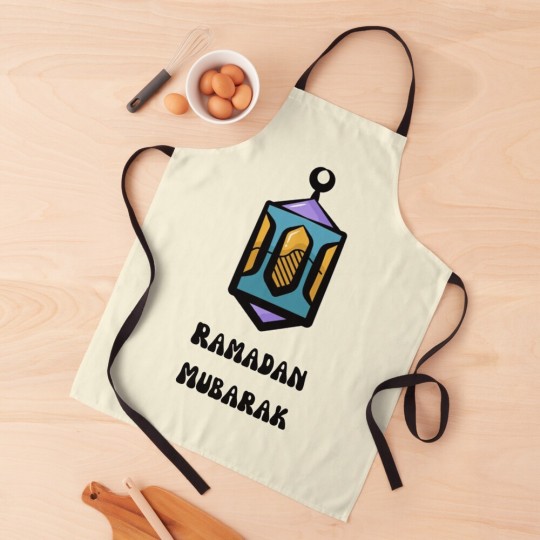
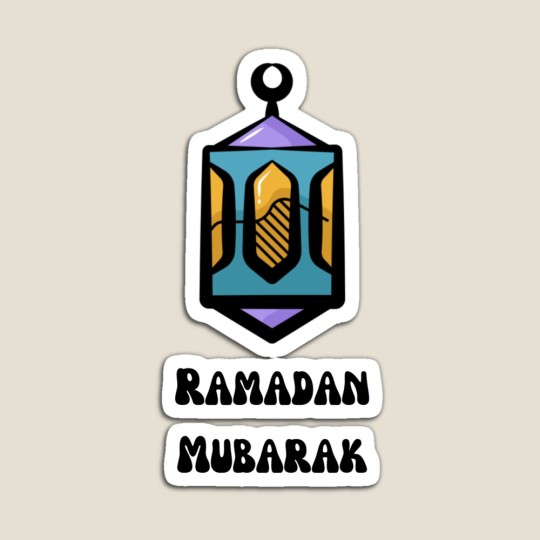
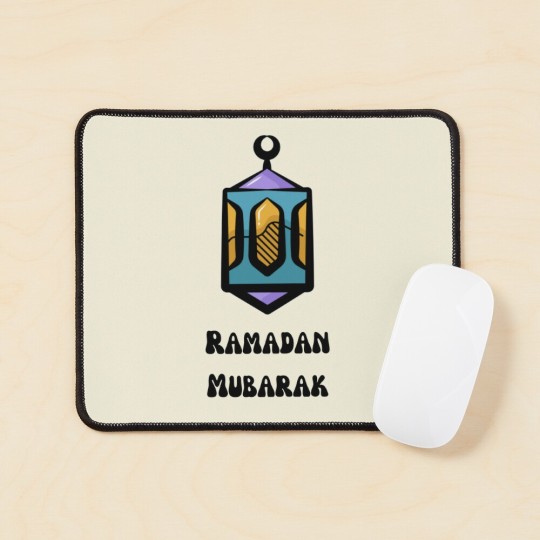
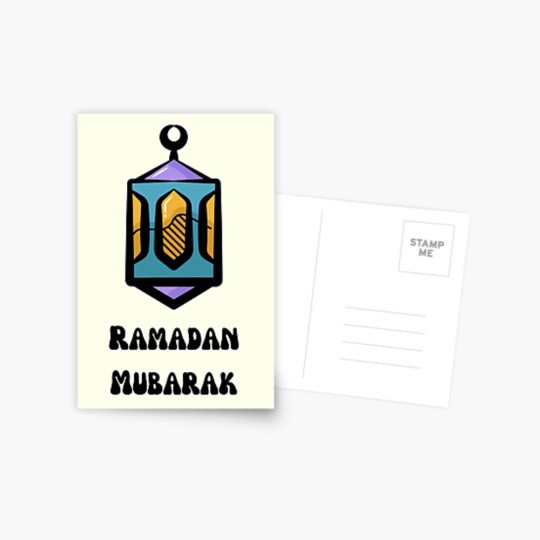



#happyRamadan#Ramadan#ramadankareem#ramadanmubarak#fasting#Islamic#Islam#Islamicart#Muslim#Muslims#greetingcard#gifts#month#lantern#happy#Ramadan2023#ramadangifts#doodle#tapestry#RamadanKareem#redbubble#art#design#illustration
0 notes
Note
what are your thoughts on the dune costumes? ive always found them so beautiful and they have left me going down rabbit holes trying to put together my own versions and collections of things i think fitting for the setting. i personally am OBSESSED with the bene gesserit and their look … and naturally lady jessica is an inspiration to us all
I was really impressed by the costuming in the movies, and I adore the attention to detail and storytelling through different clothing. You can clearly see the North African and classical Islamic inspirations
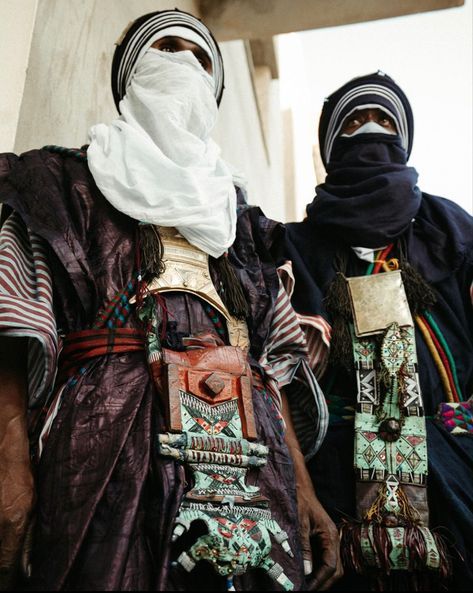
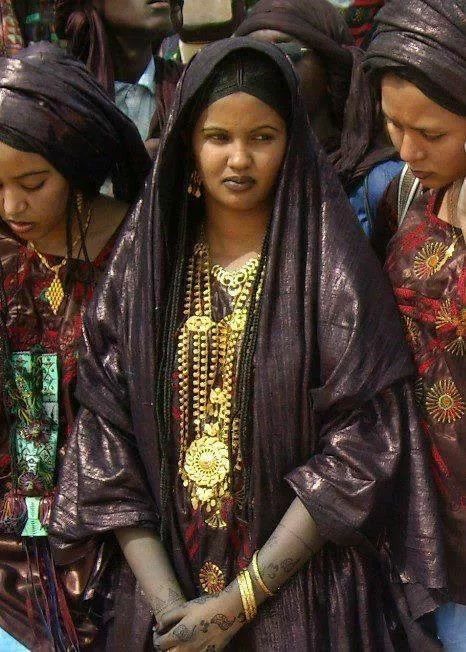
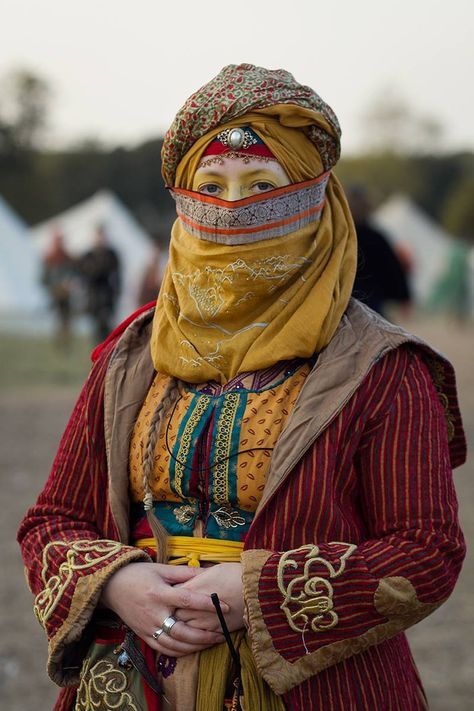
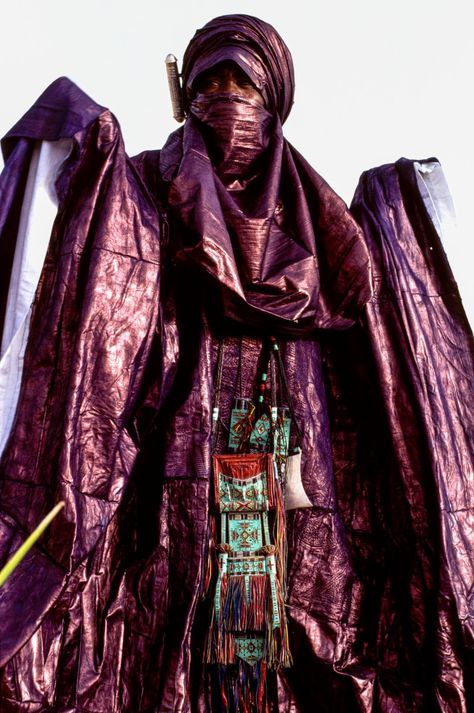
However, the one gripe I have with the Fremen costumes is the lack of color. Like these pics above are clearly the cultures the designers were inspired by, but if you see the newest movie, there is quite a lot of sandy, beige, and brown coloring and little else. Obviously if you live in the desert, you will rely on undyed or neutral colored cloth, but natural dyes are still available in these areas. Even in the book, the sietches are described as having colorful tapestries and color on the walls. The costumes were still beautiful and practical looking, but I do wish there was some individuality. There are a couple scenes near the end where Jessica and her entourage all have on brilliant dyed clothing and headdresses, so it is possible.
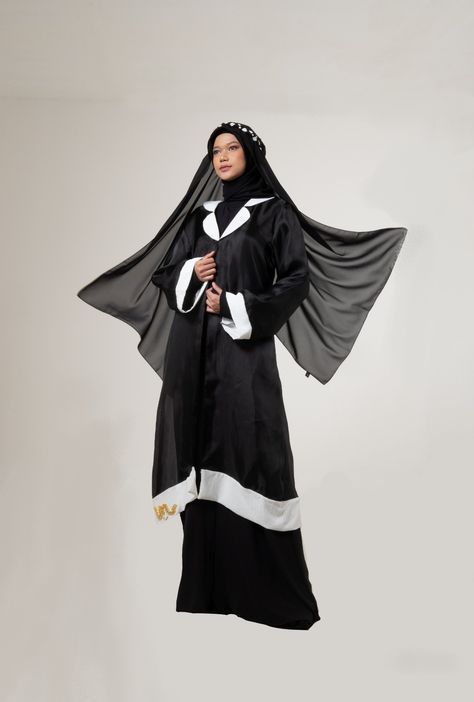
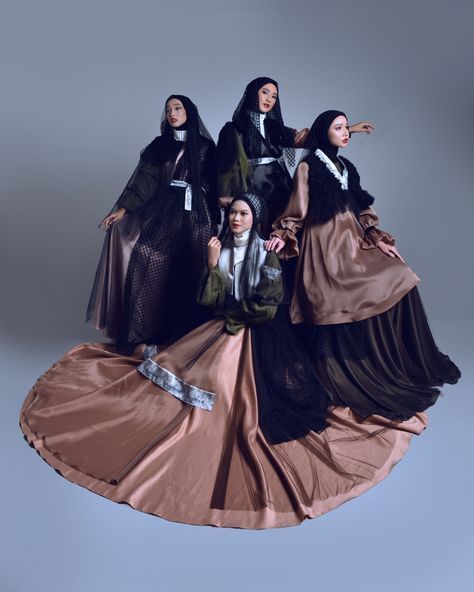
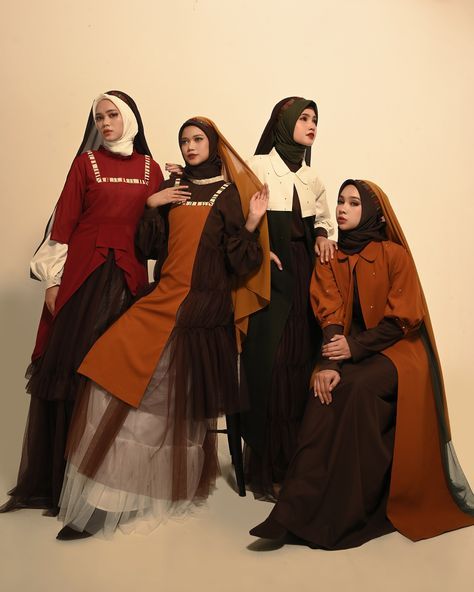
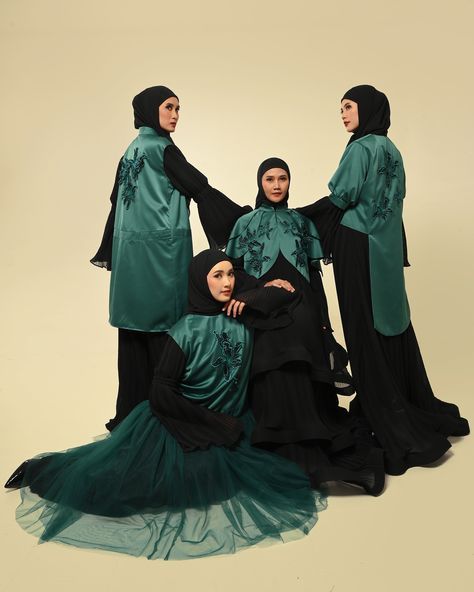

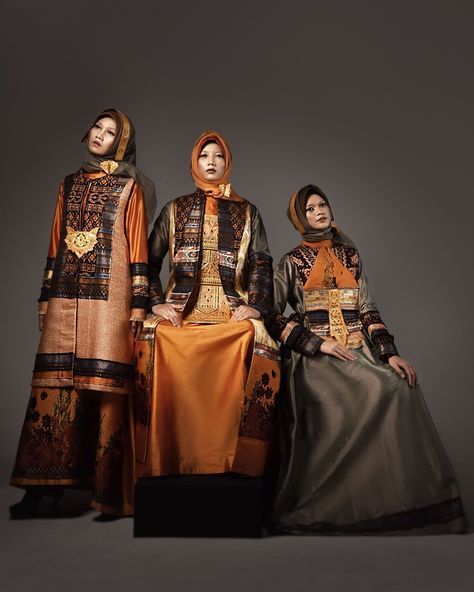
Here's me once again championing for the Islamic Fashion Institute to create all the costumes for future Dune projects, especially the Bene Gesserit show. There's an air of secrecy and mystery to the organization, and I just love the way their costumes shut the sister off from the average person as well as making them stick out as a member of the order. And these pics are giving me very regal secret sisterhood vibes


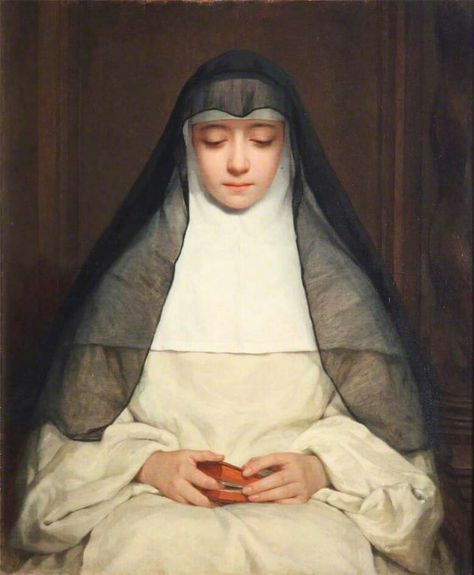



Also the catholic nun inspirations are sooooo palpable I need more people talking about this. All the strange headdresses and veils that put a barrier between the sister and the rest of the world. And not even just the costumes. Pure Catholic arrogance that this coalition of space priests could breed the savior of the world I live for it
165 notes
·
View notes
Photo
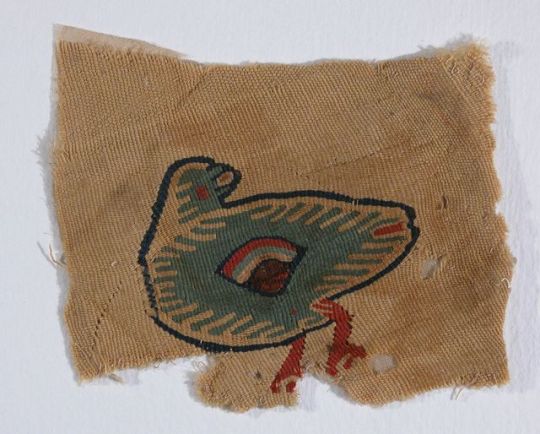
Fragment, Islamic Art Medium- Wool; tapestry weave Rogers Fund, 1909 Metropolitan Museum of Art, New York, NY. http-//www.metmuseum.org/art/collection/search/445704.jpg
403 notes
·
View notes
Text

Africa has been very rich even before colonialism
The truth you should know about African
Blacks know your history and divinity
They gave us the Bible and stole our natural resources
Community and Social Cohesion: Traditional African religions often emphasized communal values, fostering a sense of belonging and mutual support within the community. Rituals and ceremonies were communal events that strengthened social ties.
Respect for Nature: Many African traditional religions were deeply connected to nature, promoting a harmonious relationship with the environment. This connection often led to sustainable practices and a respect for the natural world.
Ethical Guidelines: These religions often included moral and ethical guidelines that governed interpersonal relationships. Concepts such as honesty, hospitality, and respect for elders were commonly emphasized.
Cultural Identity: Traditional African religions played a crucial role in shaping cultural identity. They provided a framework for understanding the world, explaining origins, and passing down cultural practices through rituals, myths, and oral traditions.
Islam reached Nigeria through a combination of trade, migration, and cultural interactions. The trans-Saharan trade routes were crucial in bringing Islam to the region. Muslim traders from North Africa and the Middle East ventured into West Africa, establishing economic ties and introducing Islam to local communities.
The city-states along the trade routes, such as Kano and Katsina, became significant centers for Islamic influence. Merchants not only engaged in commercial activities but also played a role in spreading Islamic teachings. Over time, rulers and elites in these city-states embraced Islam, contributing to its gradual acceptance.
Additionally, the spread of Islam in Nigeria was facilitated by the activities of Islamic scholars and missionaries. Scholars known as clerics or Mallams played a key role in teaching Islamic principles and converting people to Islam. They often established Quranic schools and engaged in educational activities that promoted the understanding of Islamic teachings.
Military conquests also played a part in the expansion of Islam in Nigeria. Islamic empires, such as the Sokoto Caliphate in the 19th century, emerged through conquest and warfare, bringing Islam to new territories. The Sokoto Caliphate, led by Usman dan Fodio, sought to establish a strict Islamic state based on Sharia law.
Overall, the spread of Islam in Nigeria was a gradual process influenced by trade networks, migration, the activities of scholars, and, at times, military expansion. The interplay of these factors contributed to the integration of Islam into Nigerian society, shaping its cultural and religious landscape.
In the vast tapestry of Africa's rich cultural heritage, herbal traditional healing stands out as a profound and time-honored practice. African herbal traditional healers, often known as traditional or indigenous healers, play a vital role in the healthcare systems of many communities across the continent. Their practices are deeply rooted in the natural world, drawing on centuries-old wisdom and an intimate understanding of local flora.
African herbal traditional healers are custodians of ancient knowledge, passing down their expertise through generations. They serve as primary healthcare providers in many communities, addressing a wide range of physical, mental, and spiritual ailments. The healing process involves a holistic approach, considering the interconnectedness of the individual with their community and environment.
One of the hallmark features of African herbal traditional healers is their profound knowledge of medicinal plants. These healers have an intricate understanding of the properties, uses, and combinations of various herbs. Passed down through oral traditions, this knowledge is often a well-guarded family secret or shared within the apprentice-master relationship.
The methods employed by herbal traditional healers encompass diverse approaches. Herbal remedies, administered as infusions, decoctions, or ointments, form a significant part of their treatment. These remedies are carefully crafted based on the healer's understanding of the patient's symptoms, lifestyle, and spiritual condition. Additionally, rituals, ceremonies, and prayers are often incorporated into the healing process, acknowledging the interconnectedness of physical and spiritual well-being.
African herbal traditional healers frequently integrate spiritual elements into their practice. They believe that illness can be a manifestation of spiritual imbalances or disharmony. Through rituals and consultations with ancestors or spirits, healers seek to restore balance and harmony within the individual and the community.
Herbal traditional healers are integral to the social fabric of their communities. They often serve not only as healers but also as counselors, mediators, and keepers of cultural traditions. Their practices are deeply intertwined with community life, contributing to the resilience and cohesion of African societies.
While herbal traditional healing holds immense value, it faces challenges in the modern era. The encroachment of Western medicine, issues related to regulation and standardization, and the potential exploitation of traditional knowledge pose threats to this practice. However, there is also a growing recognition of the importance of integrating traditional healing into mainstream healthcare systems, leading to collaborative efforts to preserve and promote this valuable heritage.
African herbal traditional healers are bearers of an ancient legacy, embodying a profound connection between humanity and the natural world. Their healing practices, rooted in herbal wisdom and spiritual insights, offer a unique perspective on healthcare that complements modern medical approaches. Preserving and respecting the knowledge of these healers is not only crucial for the well-being of local communities but also for the broader appreciation of the diverse cultural tapestry that defines Africa.
#life#animals#culture#aesthetic#black history#history#blm blacklivesmatter#anime and manga#architecture#black community
120 notes
·
View notes
Text
Gaza, that ancient city on the eastern shores of the Mediterranean, has come to be the political and moral compass of the entire world. Despite the pervasive destruction, Gaza stands not as a place in need of lessons. Instead, it is itself the poignant lesson of our modern age – a litmus test for humanity. As the death toll continues to rise, it becomes increasingly challenging to conceive of a violence more profound than that inflicted by machine guns and aerial bombardment. However, Israeli colonial violence – both in Gaza and Palestine more broadly – has historically manifested at various scales. It extends from the confines of a bedroom to encompass a neighbourhood, a whole city, and stretches to the scale of a regional geography.
Understanding the destruction of Gaza calls for a dual perspective. It requires zooming in on the intimate scales of violence while also being aware of these broader manifestations. At the core of Israeli colonialism in Palestine is the logic of partition, a paradigm fundamentally at odds with the land, its people and its history. Gaza has long been a nexus of interconnected worlds: for millennia, it served as a vital crossroads, connecting Palestine to Egypt and bridging the continents of Asia and Africa. The roads from Gaza to Bir al‑Sabe’, Jaffa and Jerusalem have witnessed the passage of visitors, merchants and pilgrims from diverse corners of the world. The city’s social, cultural and economic prosperity has been woven into its geographical openness, a defining feature in Palestine’s long history. Any thought about Gaza and Palestine’s future is bound to reckon with this history.
The enduring imprints of Gaza’s geographical openness are discernible in both its social and built fabrics. This ancient city has witnessed the rule of various empires and civilisations, including the Egyptian Pharaohs, Greeks, Romans, Byzantines and successive Islamic dynasties – each contributing to the rich tapestry of the city. Gaza is home to historic treasures such as the Anthedon Harbour, the port that linked the city to the Mediterranean world in the Roman era; the Great Omari Mosque, one of the most significant mosques in Palestine; and the Church of Saint Porphyrius, believed to be the third oldest church in the world.
These historic landmarks, among residential buildings, universities, museums and cultural institutions, have not escaped the intentional targeting and destruction inflicted by Israel. In essence, these sites embody all that Gaza stands for and Zionism doesn’t – geographical openness and historical continuity. In historical terms, the 75 years of Zionist domination in Palestine represent an anomaly, as Gaza and other cities have perennially thrived on cultural diversity and interconnection.
37 notes
·
View notes
Text
The Forgotten Legend of Unugai


Post written by Anar Turangi
Imagine yourself as a traveller in ancient times, riding your horse through the hushed darkness of a graveyard. As expected, the cemetery lies still and empty in the late night hours. Suddenly, your attention is drawn to an unexpected sight—a stray goat perched by a gravestone.
While you were pondering, the goat has already made eye contact with you. You would like to look away, but something draws your gaze to the goat. In a bizarre twist, the goat rises onto its hind legs, its hooves rapidly growing in size, elevating it almost to human height. Without hesitation, the transformed goat rushes at you, lightning-fast covering the distance between you.
The roar of the frightened horse brought you out of your daze and you tried to run away from the demonic creature, but it was faster. With astonishing agility, the creature leaps onto your horse and clings onto you from behind. The horse immediately weakened under the influence of the new rider, and so did you. With each passing second you feel your strength leaving you, and your resistance is futile.
However, the first rays of sunlight glimmered on the horizon, and the creature's grip began to weaken quickly. The colossal goat swiftly dismounts the horse and vanishes from your sight in the blink of an eye.
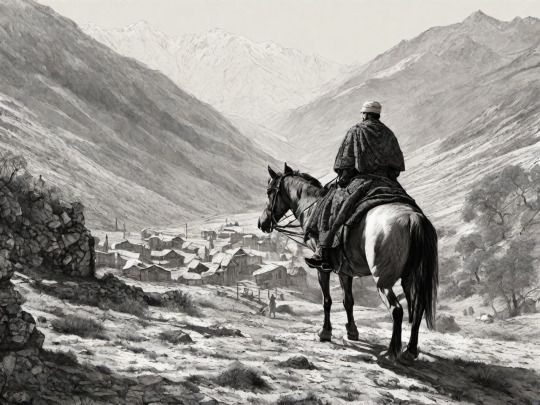

Once you come to your senses, you make your way to the nearest village, hoping to uncover an explanation for the harrowing encounter. You recount your story to the village elders, known as ağsaqqallar, who listen attentively.
After careful consideration, the elders identify the demonic creature that assaulted you last night as Unugai. The elders express sympathy for your plight, explaining that the limp you acquired from the incident will be joined by a speech impediment. The duration of these afflictions remains uncertain, leaving you with an unsettling sense of uncertainty.
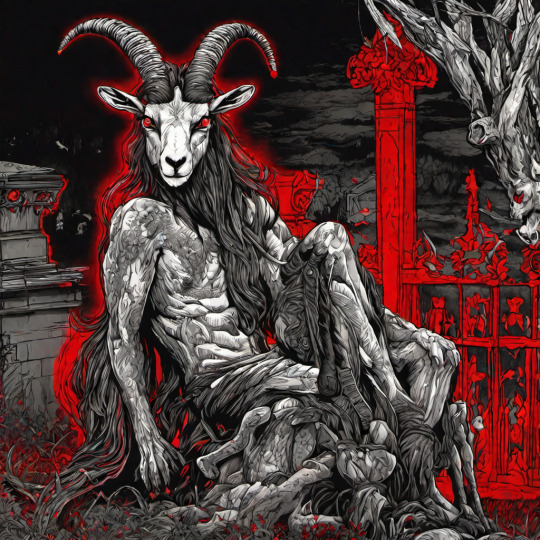
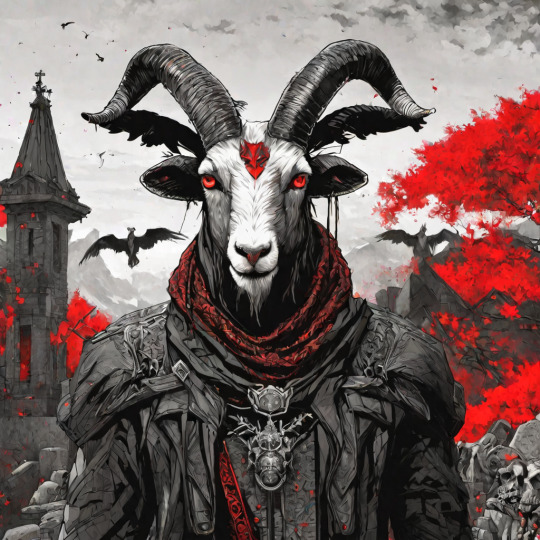

AI art concepts of Unugai
Unugai, also known as Unuqai in Azerbaijani folklore, is a captivating and enigmatic entity. Its original manifestation takes the form of a lone stray goat that seeks solace amidst the eerie stillness of moonlit cemeteries. In these sacred grounds, it lies in wait, patiently selecting its prey from the ranks of solitary travelers who dare to lock eyes with its otherworldly gaze.
With an unsettling intent, Unugai often seeks to ensnare its chosen victim in an eerie embrace, a chilling touch that inflicts torment and sends shivers down the spine. The aftermath of such a sinister encounter often leaves the unfortunate traveler plagued by sickness, an affliction that manifests as an unsettling limp and an unsettling stutter.
As tales of Unugai weave through the tapestry of legends, whispers of its vulnerabilities emerge. The creature is rumored to cower in fear at the sight of iron needles and pins, particularly when aimed at its most vulnerable points—the fragile junctures where a well-placed needle can pierce the neck or the lumbar vein.
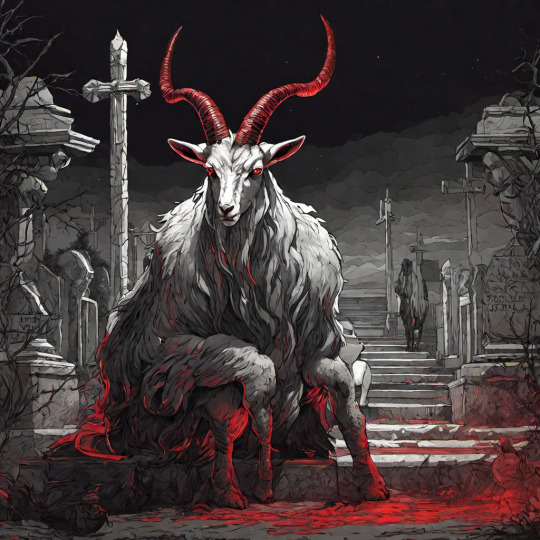
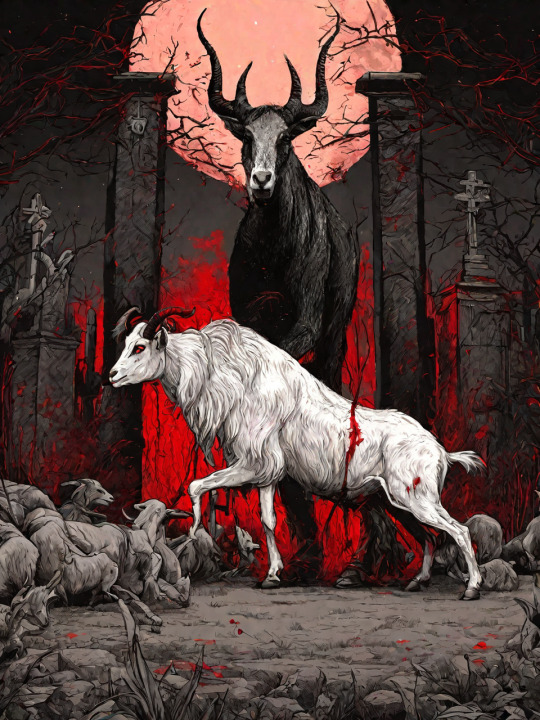
In more diabolical incarnations, Unugai preys upon pregnant women, luring them to the eerie embrace of the cemetery, where it snatches their unborn offspring for a gruesome feast.
The sunlit sanctuary Unugai retreats to during daylight remains an unsolved mystery. One can only speculate that it may visit its maternal figure, Al-Ana, a progenitor of various dark entities in Turkic myths.
Much like its mother, Unugai possesses the uncanny ability to ride a horse. However, this dread-inspiring talent casts a shadow of terror and suffering wherever it roams.
Mentions of Unugai were found mainly in the Sheki region of Azerbaijan, where tales of his ominous presence were once deeply rooted in local folklore. Yet, the passage of centuries, marked by the influence of Islamic beliefs, has nearly erased Unugai from the collective consciousness. Nowadays, the mere mention of cemeteries at night sends chills down the spines of children, who, in their fear, cry out not "Unugai!" but rather "jin," invoking the spirits of Islamic legend.
Intriguingly, archaeological discoveries in present-day Azerbaijan have unveiled enigmatic, smiling idols, thought to have been placed in cemeteries by the ancient tribes of Caucasian Albania. Their purpose remains shrouded in mystery, but a tantalizing connection emerges when exploring the legend of Unugai and its transformation into the genie narrative. It beckons us to consider that in bygone eras, similar legends may have pervaded these lands, and people, through the guardianship of idols, sought to shield their sacred resting places from malevolent forces.
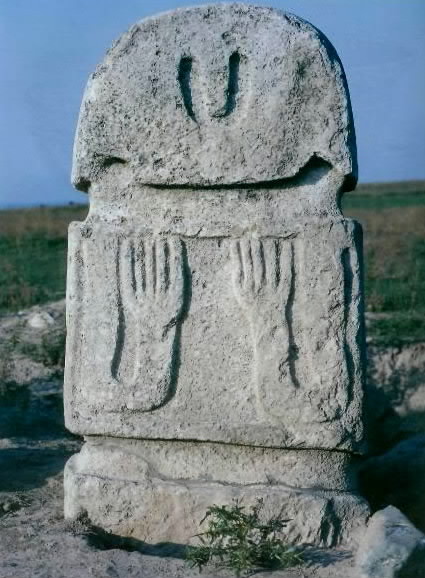
#Unugai#Unuqay#Azerbaijan#folklore#witcher#mythical creatures#art#history#mystical#pagan#medieval#antique#caucasus#легенда#легенды#мифы#мифология#кавказ#turkic#shaki#travelling#travel#tourism#kish#scp fandom#scp fanart#scp#spooktober
108 notes
·
View notes
Text
Archaeologists have unearthed a 14.5 km (9mi) oasis fortification dating back to 2250 BC in Khaybar, Saudi Arabia. This fortress standing since the 4th millennium BC tells of the vibrant history of northwest Arabia, where lush oases thrived amidst arid expanses, shaping civilizations from the Paleolithic to the present.
The mysteries of Khaybar Oasis, one of Saudi Arabia's largest walled oases, once guarded precious water resources in the desert and nomad pastoralists strategically settled in this ancient haven, marking their cultural space in the heart of the North Arabian Desert.
This ground-breaking study published in the Journal of Archaeological Science, reveals the fascinating blend of nomad pastoralists, walled oases, and the monumental fortifications that have stood the test of time, shaping the rich tapestry of human habitation in pre-Islamic northwest Arabia. Principio del formulario
26 notes
·
View notes
Text
DRAGON QUEST'S LOCALIZATION SUCKS, ACTUALLY. PART 1
There's a thread blowing up on Japanese twitter right now about the poor quality of localization. It's the first time I've ever actually seen a japanese perspective on the topic, and it's been extremely gratifying to see a ton people from over there talk about specific translation issues they've seen or learn for the first time that japanese media is often given the short end of the stick here in the USA.
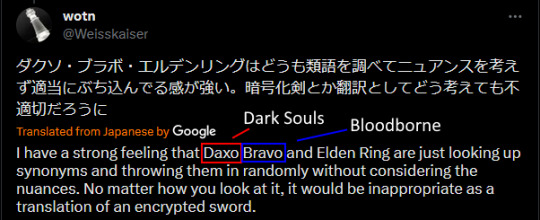



Most of the time over here in the US, criticism of localization gets shouted down as whiny fans who think they know better than the translators. It's been heartening to see that people from japan are also annoyed by it, and its inspired me to write up a whole long-ass rant I've had simmering in the back of my mind for years, so buckle up, long post(s) incoming:
Let's start at the beginning with the first thing that ever caused me to start thinking about localization. This little guy:

If you've played Dragon Quest in the past 2 decades, you probably know this guy by the name "Spiked Hare." Not me though! I got into DQ on the game boy, in the brief window of time where DQ's localization was handled by Nob Ogasawara, the same guy responsible for translating every pokemon game up until Platinum. In the DQ games Nob worked on, he chose to translate this guy's name as "Almiraj." Why the huge difference in translation? I'll get to that in a minute.
The almiraj is an extremely minor enemy in Dragon Quest 3. It's pretty weak, and it's only real defining feature is that it can occasionally cast sleep spells on your party members. It's just one of hundreds of monsters in that game, and aside from it's cute design, it's pretty forgettable. As a weird kid overly obsessed with linguistics though, its name always seemed odd to me. You don't really see words that end with a "J" in english. It stuck out enough that one night, when I was bored, I decided to google "almiraj" to figure out what the name meant. It sent me down a rabbit hole (almiraj hole?) that taught me all sorts of cool shit, and permanently altered the way I looked at localization. The path I tumbled down that night went something like this:
The Dragon Quest almiraj is named after the almiraj, a "real" mythical creature described as a hare with a large horn on its head.
The original inspiration for accounts of the almiraj (as well as the jackalope, wolpertinger, etc.) is likely the Shope papiloma Virus, which causes rabbits to grow weird, horn-like growths on their face and head.
It was described by Zakariya al-Qazwini, an Iranian lawyer, author, and all around knowledgeable guy who lived in the 13th century.
al-Qazwini described it in the Aja'ib al-Makhluqat, a massive cosmographical treatise that attempted to describe basically everything in the known universe at the time. It was so popular in the Islamic world that it was copied and translated into dozens of languages, which meant plenty of copies have survived intact to modern times.
The almiraj was brought into the limelight in modern fantasy when it was introduced in the first edition of Dungeons and Dragons, as a relatively weak and unassuming monster as part of a campaign to expand the game with monster suggestions from fans of the series.
Dungeons and Dragons-style role playing games were brought into the digital world with the release of the first Wizardry game in 1981.
Yuji Horii was a massive fan of Wizardry, which he first discovered as part of a developer exchange program when he visited America in 1983. Three years later, he decided to try and recreate the things he loved from the series for console gamers in Japan, and the the original Dragon Quest was born.
One little name was all it took to open up this entire through-line of history that I had no idea even existed before that night. It's a tapestry of human experiences over 800 years in the making, spanning continents, cultures, languages, and medium. It's probably because I'm the type of person who sits around thinking about stuff too much, but I honestly get a little emotional wondering what al-Qazwini would think if he could see the mythical creatures he described all those years ago as little dudes hopping around inside a computer.
And the thing is the tapestry doesn't end there! Dragon Quest is still pretty niche in the west, but in Japan it's fucking titanic. There's an urban legend that the Japanese government banned Square Enix from releasing Dragon Quest games on a weekday, because so many people would skip work or school that it would impact the economy. (It's not true by the way, but the fact that the rumor exists at all is a testament to how huge the series' influence is over there.) I don't think it would be an overstatement to say that what Lord of the Rings did to modern western fantasy, Dragon Quest did to modern Japanese fantasy. Almost every JRPG, manga, or anime with a fantasy setting has the fingerprints of Dragon Quest on it. Countless other works have been inspired by DQ, and those works will go on to inspire others. A million different threads weaving tapestries back and forth across time and borders, all over the globe. And the almiraj is a part of that! It might just be a single, tiny, white and purple thread, but it's still in there helping to tie things together.
So back to the question I asked earlier: Why is it "Almiraj" in Mr. Ogasawara's translation but "Spiked hare" in the current one? Simple: Nob actually translated the name.
You can see on the DQ wiki that the original japanese name of the monster is "アルミラージ" which is literally just "almiraj" written in katakana:

The current DQ team has instead decided that all monster names should be puns. I'm not against puns or anything. "Spiked hare" for a rabbit with a horn is great! I might even raise my eyebrows and exhale slightly if I read it for the first time. Dragon Quest in general tends to have a lot of goofiness in it, so it's not like puns are out of place or anything. My problem is that, by deciding to replace monster names arbitrarily like this, all the little threads start to come unraveled. You lose the ability to look back down the line and discover all these different connections to history and nature and art that you might not ever learn otherwise. The almiraj isn't the only monster to get this treatment. A huge portion of the monsters in Dragon Quest are taken from mythologies around the world, and many of their names are literally already in English, just written with katakana.
The almiraj sticks out in my mind as a particularly egregious example because of just how much I learned because of the foreign-sounding name, but there's plenty of other name changes that have resulted in straight up confusing, ambiguous, or otherwise stupid outcomes in the current localization.
CONTINUED IN PART 2
22 notes
·
View notes
Text
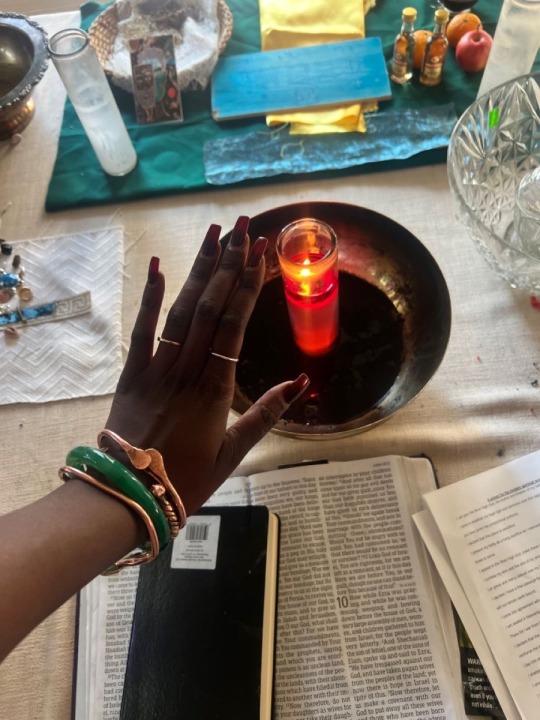
Prophecy and Mediumship in Hoodoo
♠️♦️♠️♦️♠️♦️♠️♦️♠️
Hoodoo, born in the Americas through the experiences of Black Americans, holds diverse meanings for different practitioners—some see it as a spiritual system, others as a way of life, and some, like myself, view it as a religion. Within the depths of hoodoo, there exists a myriad of practices, all stemming from the spiritual beliefs inherited from our ancestors, albeit tempered by the harsh realities of slavery.
A distinct spiritual trait that resonates strongly within the Black community is our innate ability to heal and see, particularly in the context of prophecy. Prophecy, often associated with characters in Christian philosophy acting out divine will, extends beyond religious boundaries. Prophets, far from being relics of ancient religions, exist in the present day. Whether you explore Black religions, spiritual systems, or those influenced by Black spirituality such as Islam and Christianity, you'll find an abundance of seers—individuals capable of sharing insights gained through spirit, dreams, or visions.
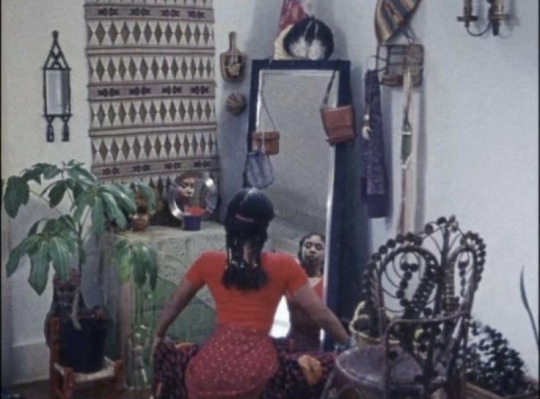
Traditional hoodoo, predating modern divination tools like cartomancy, dice, dominoes, and tarot, relied heavily on dreams and visions. Our elders would nap in prayer and awaken with revelations—a form of Black American divination. Every cultural spiritual system has its unique form of divination, and for us, it encompasses dreams, prayers, visions, and even casual conversations.
Have you ever been engaged in conversation and pieced together information seemingly from nowhere? Or encountered an elderly Black woman who warned you about potential troubles? This, too, is prophecy—an integral part of our cultural heritage.
Mediumship plays a pivotal role in hoodoo, with practitioners thriving on ancestral veneration to uplift and work with the spirits of the dead. As one progresses from a novice to a hoodoo conjurer, channels open to allow contact with spirits. Practices such as graveyard walks, visits to crossroads or forests are acts of mediumship, as conjurers commune with the spirits residing there.
In hoodoo, many of our spirits were once living, and they yearn to collaborate with us. Engaging in rituals at these sacred sites not only uplifts our spirits but also allows them to guide and support us. Authentic hoodoo practice opens channels and leads to a form of self-initiation. As you delve deeper into your journey, gifts you never knew you possessed may surface, often traced back to a specific ancestor in your family.
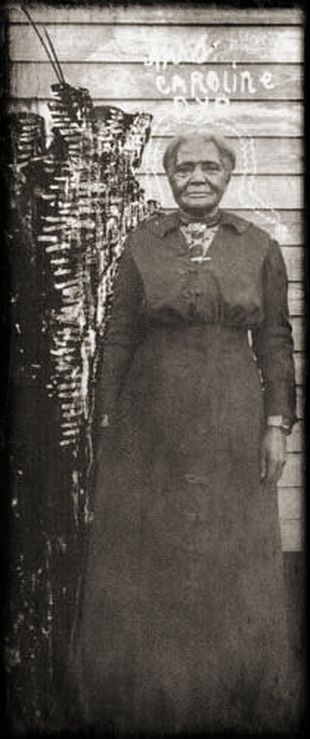
Genealogy, an essential aspect of our mediumship, unfolds through ancestral veneration. As you honor your ancestors, they guide you to where you need to be. Mediumship in hoodoo is not a hurried process; it's a journey of self-discovery and healing. Eventually, you may find yourself interceding for others, but first, there's a personal healing and transformation that awaits each practitioner.
prophecy and mediumship serves as a profound tool for both personal healing and acting as intermediaries for others. Those seasoned in the craft, having traversed the intricacies of life, acquire the ability to peer beyond the veil. In my understanding and based on research, it's evident that spiritual gifts are inherently woven into the fabric of most, if not all, Black Americans. Many, unknowingly, harness these gifts in their daily lives. However, for those consciously developing and nurturing these aspects, spiritual and tangible rewards unfold.
As a prophetic medium, my daily routine involves moments of meditation, reading, and yes, even napping—I have the privilege of being a stay-at-home wife, after all. During the rhythm of my household chores, I engage in the act of conjuring spirits, invoking protection, healing, and love, while simultaneously binding spirits that may pose a threat. This deliberate practice is an embodiment of mediumship.
Hoodoo, in essence, is an intricate tapestry of mediumship and prophecy. It transcends the conventional notions of a spiritual system, demanding more than the mere arrangement of altars and the creation of honey jars. Hoodoo necessitates an inward journey—an exploration of self that goes beyond the surface. At its core, there is no hoodoo without acknowledging and venerating the ancestors. In the practice of hoodoo, progression is contingent upon a profound acknowledgment of one's lineage.
For Black Americans, this work is not just a choice; it's a necessity. Generations of healing beckon us, stemming from the profound scars of slavery and other malicious acts directed towards our community. The true essence of hoodoo lies in the depth of this self-awareness and the unwavering commitment to healing the wounds passed down through generations. As we engage in this work, we embark on a transformative journey that not only heals the individual but also contributes to the collective healing of our people.
Follow my social media Below for more interesting Hoodoo and esoteric facts, courses, and services!
@conjuhwoeman on twitter for my daily thoughts and downloads
@realconjuhwoeman on Instagram for photos
@mymindandmeinc on Instagram for my 501c3
@realconjuhwoeman on youtube for those of you who are visual learners!
Be sure to support My Mind and Me inc and Temple of Living Word LLC project The Peoples Praise House where we are raising a Building Fund for our home fot ATR practitioners to practice freely!
51 notes
·
View notes
Text
Introduction to Islamic Architecture: A Celebration of Divine Aesthetics
Islamic architecture, an exquisite blend of art, spirituality, and culture, stands as a testament to the beauty and depth of Islamic heritage. Its intricate designs, timeless structures, and profound symbolism reflect a rich legacy cherished by both Muslims and non-Muslims worldwide.
The Influence of Islamic Art
Unveiling the Magnificence of Design
Islamic art, deeply intertwined with architecture, draws inspiration from diverse cultural traditions, incorporating elements from various civilizations while embracing its unique characteristics. The amalgamation of geometric patterns, intricate calligraphy, and vibrant colors weaves a mesmerizing tapestry adorning mosques, palaces, and monuments.
Symbolism in Islamic Architecture
Every curve, every arch, and every embellishment in Islamic architecture carries profound symbolism, offering a spiritual journey through the aesthetics. The intricate geometric patterns symbolize the infinite nature of God, while the arabesque motifs represent the interconnectedness and unity of creation.
Hadith (Sahih Muslim) — “Allah is Beautiful and He loves beauty.”
The Serenity of Islamic Gardens, Oases of Tranquility and Contemplation
Islamic gardens, renowned for their lush greenery, flowing water, and serene design, serve as havens for contemplation and reflection. They embody paradise on Earth, evoking a sense of harmony between nature and spirituality, inviting visitors to experience peace and tranquility.
These serene spaces helped weave people from all over the world, collaborating on discovering the wonders of this world.
“And of His signs is the creation of the heavens and the earth and the diversity of your languages and your colors. Indeed in that are signs for those of knowledge.” [Quran 30:22]
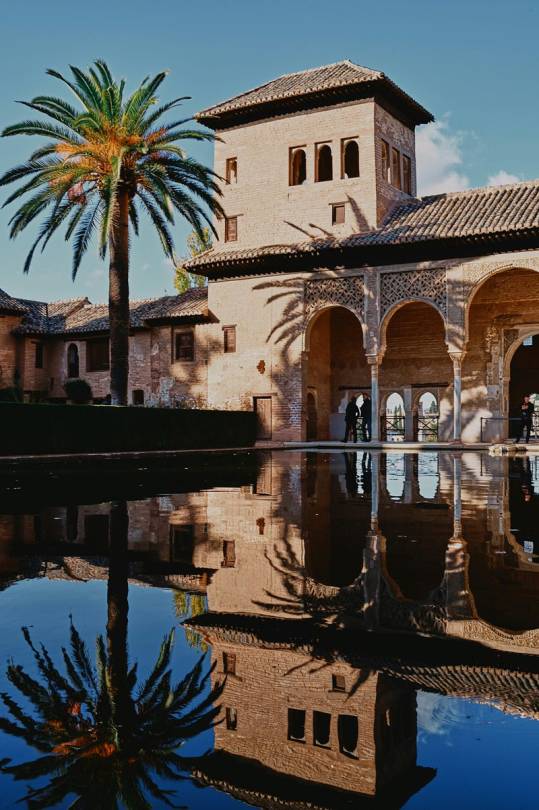
The Majesty of Islamic Calligraphy
Islamic calligraphy, an art form in its own right, transforming words from the Quran into visually striking masterpieces. The elegant strokes and fluid lines of Arabic script convey not only the literal meaning but also evoke a sense of reverence and spirituality.
Islamic architecture encapsulates the essence of Islam — its devotion, beauty, and profound spirituality. Through its artistry and symbolism, it transcends cultural barriers, offering a glimpse into a world where aesthetic marvels blend seamlessly with spiritual depth, captivating the hearts of both Muslims and non-Muslims alike.
Learn more about Islam on our website howtomuslim.org
26 notes
·
View notes
Note
Hey! I don't know if this is the proper format (still kind of new here) but I'm sending in this prompt for an Alfred × Reader fic. There's this idea for him that was stuck in my head a couple months ago. So…
It's set either S2 or S3 but it fits better in S3 or the break between 2 and 3. Alfred is really ill which isn't unusual for him, but this time he's taking a lot longer for him to heal and he's deteriorating more seriously than he normally would.
People in court start looking around for new healers and remedies. Alfred is also kind of desperate because he doesn't want to die before England is complete or Edward is ready to take over.
Reader, who is a healer, comes to court with the intention of helping Alfred. She's neither Dane nor Saxon, if you're comfortable with it she could be of Asian or African origin/descent (eg Father Benedict in S5). She's either Muslim or Christian, either way she's well read and a bit of a scholar (if you've seen Vikings: Valhalla S2, there's a female character that might ring a bell). She's also able to reassure him, like Iseult, that she's treating him with nature's bounty and nothing sinister.
Because she's a scholar (also maybe a Christian), Alfred is comfortable that she's not practicing witchcraft so this helps him accept her more easily. It also helps them bond and they become really close friends over the course of the months she spends treating him. They have fun banter and he's able to feel like Alfred, the man around her instead of King Alfred. Then he realizes that he has feelings for her.
At this point it could go any way really. Does Aelswith factor into it much or not? Does reader reciprocate his feelings or not? If she does, would she be comfortable giving into them and being a mistress? Is Aelswith even in the picture or is this a slight AU? Do they have a sad, happy or bittersweet ending? Idk
For extra spice, Reader could also be good friends with Uhtred or Finan which makes Alfred a little jealous but also sad because he thinks that she'd probably prefer the charming, handsome, potentially single, strapping man to whatever measly affection he could offer her.
Ideally, it would be fluff or smut but whatever you're comfortable writing is fine! Sorry if this is too long but I wanted to be as clear as possible 😅. I also understand if this is too much for a oneshot and you forego the idea entirely
Alfred the great x POC! Fem! Reader
Word Count: 4.6k
A/N: Heyy, so sorry this took literally eons to finally write. Thank you for your lovely request and also thank u for your patience <3 Hope you enjoy what I've done with your idea, and dw this will have another part where I'll explore their chemistry more. I watched a bunch of Alfred edits to get in the mood and ngl I'm lowkey in love with him now lmfao.
Disclaimer: there might be some (a lot) historical discrepancies because I didn't line up the dates exactly but I did find out that the Golden Age of Islam overlapped significantly with the dates that the last kingdom spans so the reader is a prominent scholar from Baghdad. Also, Aelswith is dead (I'm sorry T_T) cuz I don't love a cheating trope even when it is sort of historically accurate. So we have single dad Alfred lol.

The only heaven I'll be sent to is when I'm alone with you
Entering King Alfred's throne room, your senses were immediately awakened by the unfamiliar sights, sounds, and scents of Wessex. The room itself was a stark contrast to the opulent palaces and grand courts of Baghdad that you were accustomed to. The room was spacious, yet its decoration was surprisingly humble and simple, adorned with rough-hewn wooden beams and modest tapestries that depicted various scenes of English myths and prominent events. With a flash of triumph, you found that you recognized some of them from your studies of the English culture. A faint scent of burning wood from the hearth permeated the air with an earthy aroma.
You observed the nobles in attendance, or the ealdormen as they were called here, their attire markedly different from the splendid silks and jewels of Baghdad's court. Here, the people wore simpler garments made of sturdy wool and linen, in the dark colours of the earth as opposed to the the vibrant clothing the people of your home favoured.
Your gaze then turned to the throne itself. It was a robust wooden chair, its design austere yet imposing, lacking the grandeur of the magnificent thrones you had imagined English kings liked to occupy. King Alfred's regal figure atop the throne created a dignified presence. His clothing, matched the style of his ealdormen, long simple robes of a dull grey. The seat next to him was empty and you briefly wondered about his family. The chronicles you had read stated that a king's wife usually took her place beside him when he held court, but you did not know much of Alfred's wife.
Your fingers itched for your writing instruments, yearning to document all your observations and the happenings of the court. You seldom went anywhere without them, but now they remained tucked away in your satchel as you waited for the king to acknowledge your presence. You knew he had seen you enter, his eyes briefly meeting yours, even as he conversed with his ealdormen. Eventually, your thoughts began to wander and you couldn't help but reflect on the stark contrast between the scorching heat of Baghdad and the chilly bite of autumn in Wessex. your flowing linen tunic and trousers, so comfortable in the sweltering desert of your homeland, felt inadequate against the cold English air that seeped through the cracks in the stone walls.
You discreetly rubbed your tingling fingertips together, trying to generate some warmth, as the fire blazing at the hearth did little to banish the chill that had settled in your bones. Your longing for the warmth of the caliphate's sun was keenly felt in this unfamiliar and frigid environment.
Impatience welled up within you as you glanced around the chamber, noting the courtiers' stoic expressions and hushed conversations. The king's deliberations seemed to stretch on endlessly, and you found yourself yearning for the moment when you could finally present your credentials and seek the audience you had travelled so far to obtain.
King Alfred's voice finally called out your name, his voice echoing through the chamber.
"Esteemed lady, I welcome you to the court of Wessex."
The ealdormen, accustomed to the formalities of their court, were taken aback when you did not bow or curtsy as was expected. Instead, you offered a polite smile and tipped your head in a gesture of respect.
A murmur of surprise and disapproval rippled through the assembled courtiers. Some whispered that your behaviour was disrespectful, a breach of protocol. They exchanged curious glances, wondering how their king would react to this departure from tradition.
However, King Alfred took no offence. With a gracious nod, he signalled for you to speak.
"Thank you, your grace. It is an honour to be here."
Your accent was soft, lending your words a foreign intonation, and each syllable was carefully enunciated. You had spent months learning the language, and you weren't about to embarrass yourself now by messing up your pronunciation.
"I extend my deepest gratitude to you for undertaking such a long and arduous journey at my request. I hope the discomfort of the voyage did not prove too taxing."
"Your Majesty," you replied, "it was a journey of great honour for me, and I hope to make myself useful here."
King Alfred nodded appreciatively and then turned to a servant standing nearby.
"Please, ensure that the lady is provided with comfortable quarters and all the amenities she may require during your stay in Wessex."
The servant bowed in acknowledgment and stepped forward to escort you to your residence within the royal palace. You thanked the king once more for his hospitality and assistance before following the servant out of the chamber.
As you left the throne room, your observant nature couldn't help but take note of King Alfred's condition. Despite his attempt to appear at ease in his chair, you had perceived the subtle signs of discomfort. His favouring of his left side, indicating pain or injury to his right, and the unusually pallid complexion for an Englishman raised concerns in your scholarly mind. That was your purpose, after all, to try to diagnose and hopefully cure the ailing monarch.
Just when you were gone, the noblemen of King Alfred's court wasted no time in flocking around him, their curiosity piqued by the arrival of the enigmatic woman. They bombarded the king with questions and voiced their concerns about the unfamiliar customs you had displayed.
One nobleman, his voice dripping with skepticism, remarked, "Your Majesty, did you see that? She didn't bow or curtsy as she should have! It's as if she has no respect for you."
Another, eyeing your unusual attire and complexion, chimed in, "And her clothing, Your Grace! It's unlike anything I've ever seen in Wessex. She's clearly not from anywhere near England. What could she possibly want here?"
The murmurs of disapproval and suspicion spread among the courtiers, as they exchanged perplexed glances. To them, your arrival was an anomaly, and your behaviour had raised eyebrows and questions.
King Alfred, his countenance calm and measured, raised a hand to quell the growing unease.
"I understand your concerns, but there is nothing to worry about" he began, addressing their concerns. "The lady you have just met is a prominent figure from Baghdad. She has travelled from a distant land to be here and she is not here to defy our traditions or customs. She is a scholar seeking to further her studies in Wessex. Her journey to our land is a great honour, as it reflects the recognition of the importance of our own intellectual pursuits."
His tone left no room for further skepticism. He also did not mention the other reason you were there, as he did not wish to reveal the truth of his declining health. As the nobles filtered out of the room, somewhat still unsatisfied by his answer, Alfred couldn't help but remain still, his mind going over the recent developments. When he had first written to the Abbasid Caliphate to request that he be allowed to host a medical scholar at his court, he had to admit he was not expecting a woman, and certainly not one so beautiful.

The next day, Alfred summoned you to his private chambers for a consultation regarding his health. As you entered the room, he couldn't help but notice the change in your attire. Gone was the flowing linen tunic and trousers, replaced by a sturdier, more practical woollen English dress. The deep blue gauzy veil, however, was still draped around your head and flowed down your back.
The English clothing seemed to complement you, accentuating your elegance in a way that was both unexpected and captivating. The king, not for the first time, found himself admiring you, though he kept such thoughts to himself, mindful of the formal context of your meeting.
You, ever the professional scholar, maintained a polite and formal distance as you began your examination of the king. You inquired about his symptoms, listening attentively to his description of the pain and discomfort he had been experiencing. Your deep knowledge and keen medical insight were evident as you asked probing questions and conducted a thorough assessment.
After a careful evaluation, you began to discuss your observations and your initial diagnosis with the king. You explained your thoughts on the potential causes of his discomfort and suggested a course of treatment. King Alfred was grateful for your expertise, and couldn't help but be struck by your intellect. He had a thirst for knowledge himself and he appreciated the quality in others when he saw it. In you he recognized a passion for learning and documentation, one he held himself as well. After the medical examination, he extended an invitation to you to remain in his chambers and share a cup of tea. Initially hesitant, you eventually agreed, recognizing the value of the opportunity to engage in conversation with the English monarch.
Seated in the warmth of the chamber, Alfred began to share with you the rich history of England, its struggles, its triumphs, and its cultural tapestry. He spoke of the challenges of the Anglo-Saxon period, the battles against the Danes, and the enduring spirit of the English people. As he narrated the history of his land, Alfred couldn't help but notice how your eyes lit up with a deep fascination, even though you attempted to contain your enthusiasm. Your questions flowed naturally as you probed deeper into the history and culture of Wessex. You asked about the Anglo-Saxon kings, the legends and folklore, and the development of the English language.
You kept diligent notes in your little notebook, your hand swiftly capturing every detail of the conversation. Your keen intellect and insatiable thirst for knowledge were evident, and your genuine interest in Alfred's words warmed his heart. It had been quite a while since anyone had paid such rapt attention to what he was saying, and he found himself rejuvenated by your exchange.
As a lull settled over your conversation, Alfred's curiosity got the better of him. With a twinkle in his eye, he leaned forward and said, "My lady, I must admit, I'm quite curious about the contents of that notebook of yours. What sort of information have you been documenting to take back to your homeland?"
You smiled, your demeanour more relaxed than when you had first come in, "Your Majesty, you need not worry. I promise you, I haven't written that the English are fire-breathing trolls."
Alfred felt a grin tug at his lips, but he suppressed the urge, keeping his hands folded placidly over his stomach.
"Well, you know, if we English could breathe fire, we might have an easier time dealing with our enemies!"
"There is a trick that performers back home use, to give the illusion of breathing fire. The science behind it is quite fascinating. Perhaps I shall explain it to you sometime."
"Ah yes my lady, you have filled your book with our tales, but have yet to share yours. Do you have any secrets from the East that you'd like to share with us humble English folk?"
You couldn't help but smirk at his words, "I'm afraid some secrets are best left in the lands where they belong, your grace. We wouldn't want you to start brewing Persian tea incorrectly, now would we?"
"I doubt it can compete with our tried and trusted English tea."
"You only think that way because you haven't tried Persian tea yet. Trust me, once you have, there's no going back."
"I suppose you make a fair point! Although, I must admit, the thought of trying to decipher the intricacies of Arabic calligraphy is rather tempting."
You paused, your light-hearted nature urging you to make another joke but you strictly reminded yourself that you were in the presence of a king. It would do you no good to offend him with an ill-timed statement. You were already apprehensive about your earlier comment about the Persian tea, although you were grateful that he chose not to see it as a slight. As if sensing your hesitation, Alfred sat up in bed and leaned forward.
"You are free to speak my lady, do not hold yourself back on my account," he reassured with a wave of his hand.
Still, you settled for a polite smile, "I was just going to remark on the difficulty of calligraphy but I am certain that if anyone would be able to master it, it'd be you, Your Majesty."
A small furrow appeared between Alfred's brows as if that wasn't the answer he expected from you. He could see you pulling away, going back to your polite, almost cold professionalism. Eventually, he nodded thoughtfully at you.
"I would be ever so grateful if you could perhaps show me the technique someday, my lady."
You breathed a sigh of relief and nodded with a small smile.
"Now, about that notebook, if you would allow me to take a look?"
"Ah yes, of course," you handed over the small leatherbound journal to him quickly without further complaints. "But I must warn you, my handwriting isn't at its most legible."
Alfred accepted the notebook with a nod of appreciation. As he leafed through its pages, his eyes quickly fell upon your meticulously written notes. Your thoughts were inscribed in your native language and although he did not understand the words, your elegant looping script impressed him.
He raised an eyebrow and turned toward you expectantly, pointing toward a specific passage, "And what does this say right here?"
"It is a description of the English weather, your grace."
Alfred leaned closer, his finger tracing the inked lines on the page.
"Ah yes, English weather. It was raining when you first arrived, wasn't it? What do you think of our English rain then, my lady? I've heard it has a certain charm."
"Well, I believe your rain can be quite persuasive. It insists that one should stay indoors and read a good book."
Alfred's lips twitched again, fighting back a smile. It seemed that the new scholar shared his interests as well.
"A wise perspective, indeed. Perhaps our English rain is simply encouraging a literary lifestyle."
"Yes, your grace."
"My lady" he continued, a note of genuine admiration in his voice, "I must tell you, your handwriting is truly exquisite. Tell me, just how many languages have you learned."
You felt a blush creep into your cheeks at his compliment. There was something sincere in his eyes as he waited for your answer, looking at you like your accomplishments were the greatest thing in the world. You opened your mouth to respond but then a loud knock sounded on the door and a priest entered.
"Yes, Father Beocca," Alfred seemed irritated at the interruption.
Father Beocca's eyes glanced from you to the king, and despite the fact that you were sitting in a chair quite some distance away from him, you felt a strange flash of awkward embarrassment run through you.
"My king, Uhtred is here to see you," the priest finally stated.
Alfred sighed and turned toward you with an apologetic smile, "Shall we continue our conversation another time then, my lady? It seems that I am needed elsewhere."
"Yes, of course, your grace."
You quickly took your leave then, choosing to take one of your books and go read in the garden. You had just settled yourself into a comfortable nook when loud boisterous laughter caught your attention. Turning your gaze towards the source of the commotion, you spotted three men, two of whom were dressed in the attire of warriors. Their boisterous behaviour was evident as they playfully teased and shoved the third man, who was clad in robes that resembled those of Father Beocca. However, a leather breastplate adorned his monk's attire, hinting at a surprising duality of roles – priest and fighter.
The two warriors were engaged in a lively exchange with the monk, their laughter echoing through the garden. You couldn't help but smile as you watched the scene unfold. Their camaraderie and jesting reminded you of the Caliph's sons back home, when your father would take you to visit the palace.
One of the warriors, a bearded man with broad shoulders and a hearty laugh, clapped the monk on the back.
"Come now, Osferth," he said between chuckles, "surely your devotion to the Lord could use a bit of levity now and then."
The monk, Osferth, grinned in response, "Aye Finan, it is said that laughter is the best medicine, is it not?"
The other warrior, a lean and quick-witted fellow, joined in with a jest, "Well, if that's the case, Osferth, then Finan here will live to be a hundred and you shall die tomorrow!"
Osferth elbowed the tall man in the ribs, "Not before I knock some sense into you Sihtric."
Their jovial banter and good-natured teasing continued, creating a lively atmosphere in the serene garden. You couldn't help but be amused by their antics and the familiarity of their interactions, watching them for quite some time.
The trio of men eventually noticed your presence, and with their laughter dying down, they made their way over to you. As they approached, their expressions revealed a mixture of curiosity and surprise.
The broad-shouldered warrior, Finan, whose eyes twinkled with mischief, was the first to speak. "Well, what have we here?" he said with a grin. "A traveller from foreign shores, I presume?"
"Yes, I am from Baghdad, my lord."
The warrior, clearly taken with you, couldn't resist a flirtatious remark.
"Lady, I must say, you are a wondrous addition to our English garden."
You snorted at his attempt at flirtation.
Meanwhile, the monk with the leather breastplate maintained a more respectful demeanour.
"Greetings, lady, I am Osferth," he said with a nod. "It is a pleasure to make your acquaintance. May I ask what brings you to our humble Wessex?"
You found the monk's polite curiosity quite refreshing.
"Greetings to you too, Osferth. I've come to further my studies here. Wessex has much to offer in terms of knowledge and history, and I hope to make the most of it."
"Well, my lady, if ever you wish to explore our English shores, I'd be delighted to be your guide," it was Finan who spoke again and you could not help but laugh at his words.
"Thank you, kind sir. Your offer is most gracious."
“Call me Finan, my lady.”
Your change continued as they asked more about you and your hometown and you asked about theirs. You found out that they were a band of warriors who followed some fellow named Uhtred, the very same Uhtred who was currently speaking to King Alfred. As the conversation flowed, you discovered that you enjoyed speaking with these men. Their witty banter and friendly demeanour made you feel at ease, despite the foreignness of your surroundings. You shared stories of your travels, your scholarly pursuits, and the cultural nuances of your homeland. The men, in turn, regaled you with tales of their own adventures.
As you continued to engage in playful banter with the warriors, you remained oblivious to the presence of King Alfred and Uhtred, who had ventured outside and were observing the lively exchange.
Eventually, with a confident stride, Uhtred made his way toward your group to make his introduction and Father Beocca approached the king with his concerns.
"Your Majesty," he began cautiously, "I must admit, I have reservations about entrusting your treatment to a foreigner, especially one from so distant a land. We must be cautious of witchcraft and unfamiliar practices."
King Alfred turned to Father Beocca, his expression thoughtful but resolute, "Father Beocca, I understand your concerns, but the lady is no ordinary foreigner. She hails from Baghdad, a city known for its innovative medical advancements and a center of learning in the Islamic world. She comes as one of their finest scholars, sent by the Caliph himself."
"I see, your grace."
"I have read extensively about the great Islamic civilization, and its contributions to science, medicine, and philosophy. I believe we have much to learn from her, not only about medicine but also about fostering understanding and collaboration between our cultures. They have succeeded in uniting several lands under one caliphate, so perhaps we might learn how we may unite England as well."
Father Beocca, though still cautious, nodded in understanding, "Your Majesty, I trust your judgment. It is my fervent hope that the lady's presence here will indeed lead to beneficial knowledge and that she will uphold the values of wisdom and compassion."
"Thank you, Father Beocca. Let us have faith in this unique opportunity for cultural exchange and enlightenment. Her presence is a bridge between worlds, and I believe it is a path toward a brighter future for Wessex."

Over the course of the next few months, you became familiar with the routines of the Wessex palace. King Alfred allowed you to shadow him throughout his day, believing that you could provide valuable insights into his own activities. It was a decision that would lead to a profound connection between the two of you.
Every day, you diligently prepared poultices and medications for the king’s ailments, and often you’d recite the recipe to him and explain the purpose of each herb and plant that went into it. He found that he trusted you completely but he was still comforted by your transparency and the efforts you took to explain things to him. Sometimes he would insist on accompanying you on walks and you would point out the various native English plants and their counterparts back home. You also documented the king's activities and observations in your notebook. At times, he would request to see your notebook, often just to admire the beauty of your script. He marvelled at the graceful lines of your writing, and the intricate calligraphy that adorned the pages.
Your interactions went beyond the formalities of your initial meeting. King Alfred, always eager to learn, would occasionally ask you to translate certain passages from your native language and over time, your bond grew stronger. King Alfred began to look forward to each day, eager to see your bright and colourful veil, a striking contrast to your plain English gowns. He would wonder which hue you would choose, and it became a delightful anticipation in his daily routine.
Your conversations transcended the realm of duty and scholarly pursuits. The two of you shared your favourite books, discussing the nuances of various works and debating the merits of different translations. Your insights challenged Alfred's own understanding, and he cherished these moments of intellectual stimulation.
As the days turned into weeks and then months, Alfred realized that you had become an important fixture in his life. your presence was a source of inspiration, a reminder of the power of knowledge, and a testament to the potential for understanding and collaboration between different cultures.
He found himself thinking of you when he was apart from you, reminiscing about how your eyes would dance with mirth as you argued with him about the inaccuracies of translated works, or how your laughter would fill the palace corridors. You had not only enriched his pursuit of knowledge but had also touched his heart, becoming a cherished friend and confidante in the process.
Alfred could still vividly recall the way you had looked at him with genuine wonder and appreciation when he had shown you his humble library. He knew that compared to the great libraries of Alexandria and Baghdad, his collection was modest, but you had delighted in it all the same. Your eyes, filled with curiosity and admiration, had swept over the numerous scrolls and manuscripts, taking in the wealth of knowledge contained within those walls.
In that moment, as you softly murmured your thanks, Alfred felt his breath catch. He was struck not only by the beauty of your physical presence but also by the grace with which you carried yourself and the genuine enthusiasm you displayed for learning. Your voice had a melodic quality that lingered in his memory. It was a voice that seemed to breathe life into the ancient texts that surrounded you and the king found himself quite enamoured with you. The two of you spent many a late night pouring over scrolls together, and although he always kept a respectful distance, Alfred found himself wanting to brush away the stray strands of hair that fell across your forehead, having escaped the tightly bound coil you usually kept your hair in.
Tonight was one such night as the dim light of the candle burned low, and after a lively discussion on herbal medicine, you had fallen asleep on one of the ancient manuscripts. Alfred, his mind still buzzing with the echoes of your conversation, fought against the pull of sleep. Instead, he watched you slumber, his heart filled with a mixture of admiration and tenderness.
In the soft candlelight of the library, you appeared even more enchanting. Your thick eyelashes brushed against your cheeks as you slept peacefully, your features serene. Your form rose and fell with each gentle breath, a rhythmic reminder of the tranquil cadence of sleep. Alfred couldn't help but be captivated by your beauty in this unburdened state. The play of shadows and light highlighted the delicate contours of your face, and the soft glow of the manuscripts around you lent an almost ethereal quality to the scene. You looked like a vision from a dream.
As he watched your slumber, a sudden, unexpected urge welled up within him. He was struck by the temptation to lean in and kiss you, but he quickly banished the traitorous thought. What an absurd thing for a king to do, to force his affections on a guest in his home. Especially when he had no way of knowing if you returned his feelings. He would have to content himself with the simple act of watching you sleep, his heart filled with a deep and unspoken longing.
He also found himself wondering if you were betrothed, for you couldn’t possibly be married and still be here. What man would not accompany you or let you out of his sight if you were his wife? Although you had discussed many things, you did not stray close to personal topics such as family. You were only a few years younger than him and surely you had to have someone in your life. And even if you didn’t, what could you possibly want with an ailing man like him when a woman as accomplished as you could have anyone in the world?
Such melancholy things plagued him as he eventually drifted asleep on the table across from you, his final thoughts fixating on what it might feel like to have your lips against his.
#the last kingdom#uhtred#alfred the great#tlk alfred#alfred x reader#tlk uhtred#tlk x reader#tlk fanfic#tlk season 3#alfred the great x reader#tlk alfred x reader#tlk sihtric#sihtric#tlk osferth#osferth x reader#sihtric x reader#uhtred x reader#finan x reader#tlk finan#tlk fandom#tlk x you#finan imagine#uhtred of bebbanburg#osferth imagine#ewan mitchell
51 notes
·
View notes
Text
Ramadan Kareem 2
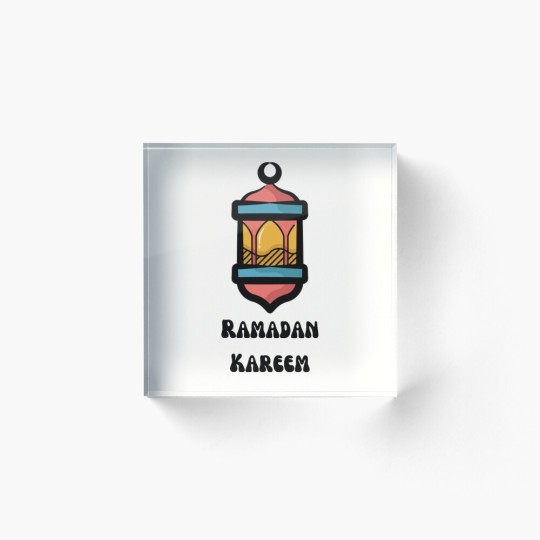




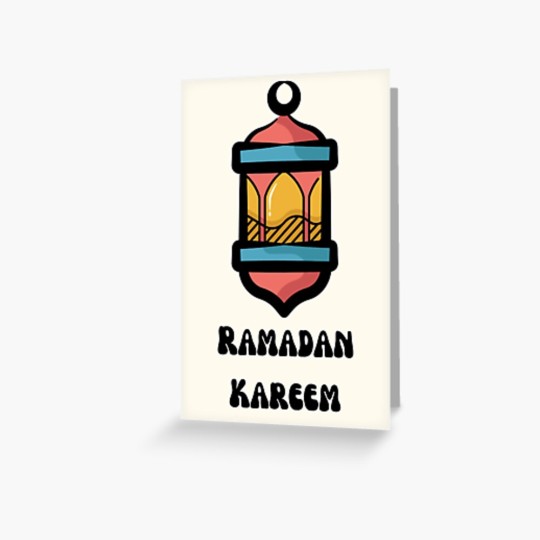
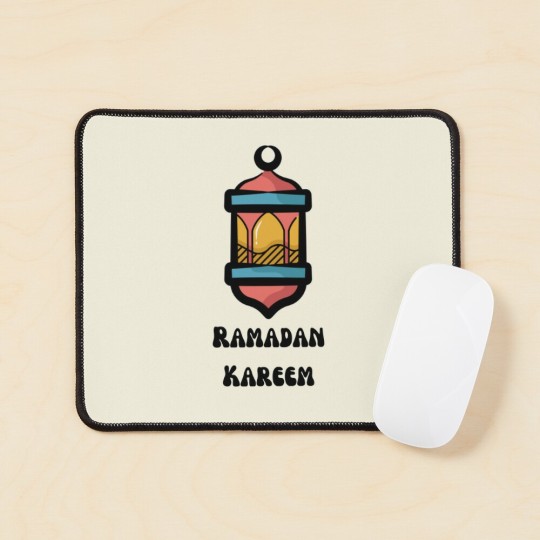



#happyRamadan#Ramadan#ramadankareem#ramadanmubarak#fasting#Islamic#Islam#Islamicart#Muslim#Muslims#greetingcard#gifts#month#lantern#happy#Ramadan2023#ramadangifts#tapestry#homedecor#redbubble#fashion#art#design#illustration#shopping
1 note
·
View note
Text

29th March 1958 saw the death of Sir William Burrell.
In 1876 William entered the firm at the age of 15, and on his father’s death in 1885 he and his eldest brother George took over the management. the firm was already prospering, but under their shrewd direction it reached a position of international standing in worldwide tramping and in ship management.
Burrell was a collector from an early age, buying his first painting when aged only 15, but it was Glasgow’s industrial ascendancy that would allow him to continue financing his passion for art, and the added success of the firm his father founded.
Building and buying ships when world markets were weak, Burrell built up and sold two great ocean-going fleets, providing him with the wealth needed to search the world for art and antiquities. Even better, his global shipping contacts meant he knew where and when certain treasures were being auctioned.
Burrell was far from alone in this passion, and as his fellow Glasgow industrialists grew wealthy, they too invested in art – both ancient and modern – to show off to their friends. Where Burrell differed, however, was that he was no show-off.
He was a serious collector, with wide-ranging interests and passions. By 1900 he had become a respected collector in the fields of late Gothic and early Renaissance European art and late 19th century French art.
In 1901, Burrell was one of the largest donors of artworks to the Glasgow International Exhibition. This was an event which left an indelible mark on the city, with the opening that year of the much-loved Kelvingrove Art Gallery and Museum. In 1927, Burrell was knighted for services to art and for his public work.
But Burrell was certainly no snob when it came to his collection. He was a believer in free education for all and wanted the people of his home city to be able to access his fine collection. It’s for this reason that, in 1944, he donated his entire collection to his home city – a collection that contained more than 9,000 items at the time.
Shortly afterwards, Hector Hetherington, then Principal of Glasgow University, famously said of Burrell’s collection that it was:
“One of the greatest gifts ever made to any city in the world”.
By the time of his death in 1958, Burrell had been collecting for 75 years - and what a collection it is. From Chinese and early Islamic ceramics to Late Gothic and Early Renaissance works of art from Northern Europe, including tapestries, stained glass, sculpture, arms and armour, architecture and furniture.
Burrell’s collection takes visitors on a tour of 6,000 years of world history, connecting them to the people who made the exquisite works and to the people who have owned them down the centuries; making exciting new connections through time and place.
At the time of his gift, Burrell had stipulated that any new gallery must be 16 miles from the city centre. This was partly because he believed that a rural setting would show the works to their best advantage, but also to place them far away from possible damage by atmospheric pollution caused by Clydeside's heavy industries and tenement chimneys. By the time of Burrell's death in 1958, a suitable site had still to be found.
That problem was solved in 1966, when Mrs Anne Maxwell Macdonald gifted her family’s 360-acre Pollok Estate to the City of Glasgow. Although a mere four miles from the city centre, it seemed the perfect location for the vast Burrell Collection.
That said, it took a further 17 years, and an international design competition, before architect Sir Barry Gasson’s £20m building opened to the public.
The combination of exceptional art and architecture set within one of Europe’s largest urban green spaces was an immediate success, described by The Glasgow Herald as ‘a magical mystery tour and an aesthetic event rolled into one’. The Burrell Collection has since been a key driver in Glasgow’s transformation from a place of post-industrial decline to one of the great cities of culture.
In October 2016 the building closed for a major £68.25 million refurbishment. The Burrell Collection reopened today, its greatly expanded spaces promise improved access, understanding and appreciation of one of the world’s most extraordinary personal collections.
15 notes
·
View notes
Photo

The earliest surviving carpet - the Pazyryk Carpet - 5th century BC.
Across the globe, weaving was being used to create an alternative to the tapestries of medieval Europe. Carpets were just as portable, decorative and luxurious as tapestries but were instead used to cover floors, not walls. The earliest surviving carpet - the Pazyryk Carpet - amazingly dates from the 5th century BC, in what is now modern-day Armenia but what was then part of the Persian Empire. Historic evidence of carpets can be found all across Asia, but particularly in the Islamic world where the use of prayer rugs was - and continues to be - widespread. The Quran actually mentions carpets on several occasions, stating that they can be found among all the comforts of Paradise.
https://www.thurmanovich.com/.../on-the-cutting-edge-a...
215 notes
·
View notes
Text
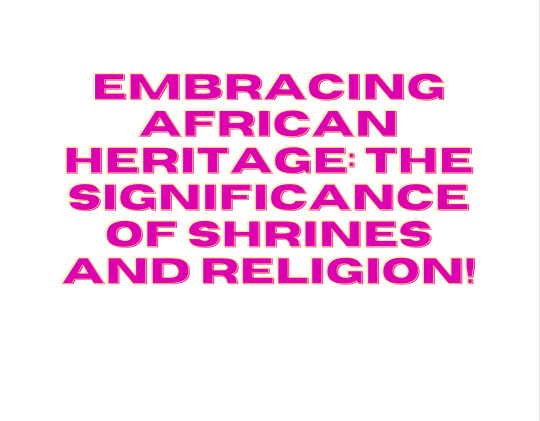
Embracing African Heritage: The Significance of Shrines and Religion
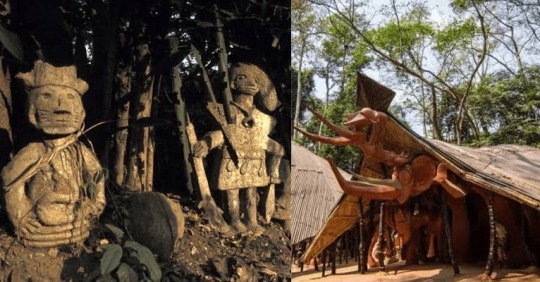
Africa, often referred to as the cradle of humanity, boasts a rich tapestry of cultures, traditions, and spiritual beliefs that have endured for millennia. Central to this heritage are the sacred shrines and profound religious practices that serve as pillars of community, identity, and connection to the divine.
Shrines, both natural and constructed, hold a special place in African spirituality. These sites are often nestled in the heart of communities or hidden within the vast landscapes of the continent. From the iconic pyramids of Egypt to the humble groves of the Yoruba in Nigeria, each shrine reflects a unique blend of history, mythology, and reverence for the ancestors.
One of the fundamental aspects of African religion is the veneration of ancestors. Ancestral shrines serve as focal points for prayers, offerings, and rituals aimed at honoring those who came before. These ancestors are believed to possess wisdom, guidance, and protection, and their spirits are invoked for blessings and assistance in times of need. In many African societies, the bond between the living and the dead is deeply cherished, with rituals and ceremonies reinforcing the interconnectedness of past, present, and future generations.
Moreover, African shrines are often associated with specific deities or spirits, each embodying different aspects of the natural world or human experience. Whether it's Oshun, the Yoruba goddess of love and fertility, or Anubis, the ancient Egyptian god of the afterlife, these divine entities are revered through elaborate ceremonies, dances, and sacrifices. Through these rituals, devotees seek communion with the divine and seek guidance in matters of health, prosperity, and spiritual growth.
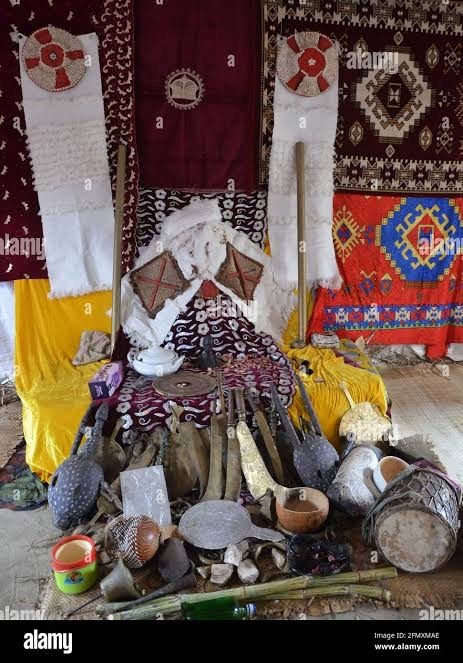
However, the significance of African shrines extends beyond the realm of spirituality. They are also repositories of cultural knowledge, oral traditions, and historical narratives passed down through generations. Within the sacred precincts of these sites, elders impart wisdom, storytellers weave tales of heroism and creation, and artists imbue their craft with symbols and motifs that speak to the essence of African identity.
Unfortunately, the colonial era and the spread of Christianity and Islam have often marginalized indigenous African religions, dismissing them as primitive or pagan. Despite this, many communities continue to uphold their traditional beliefs, adapting them to the challenges of modernity while preserving their core values and rituals. In recent years, there has been a renewed interest in African spirituality, fueled by a desire to reclaim cultural heritage and reconnect with ancestral roots.
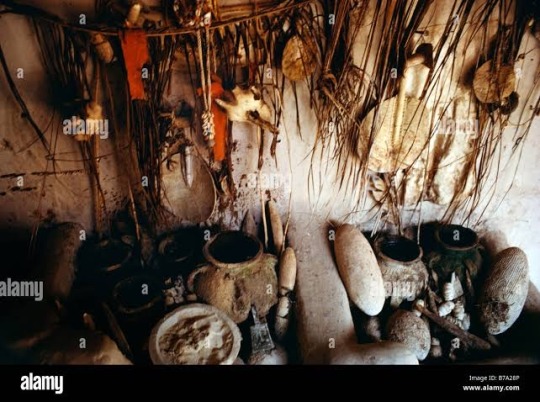
In conclusion, African shrines and religion embody the resilience, diversity, and spirituality of the continent's people. They are more than just places of worship; they are living testaments to the enduring legacy of Africa's past and the enduring power of its traditions. As we navigate an increasingly interconnected world, embracing and honoring Africa's rich heritage is not only a matter of cultural preservation but also a celebration of the human spirit's boundless capacity for faith, creativity, and reverence for the divine.

#life#animals#culture#aesthetic#black history#history#blm blacklivesmatter#anime and manga#architecture#black community
56 notes
·
View notes